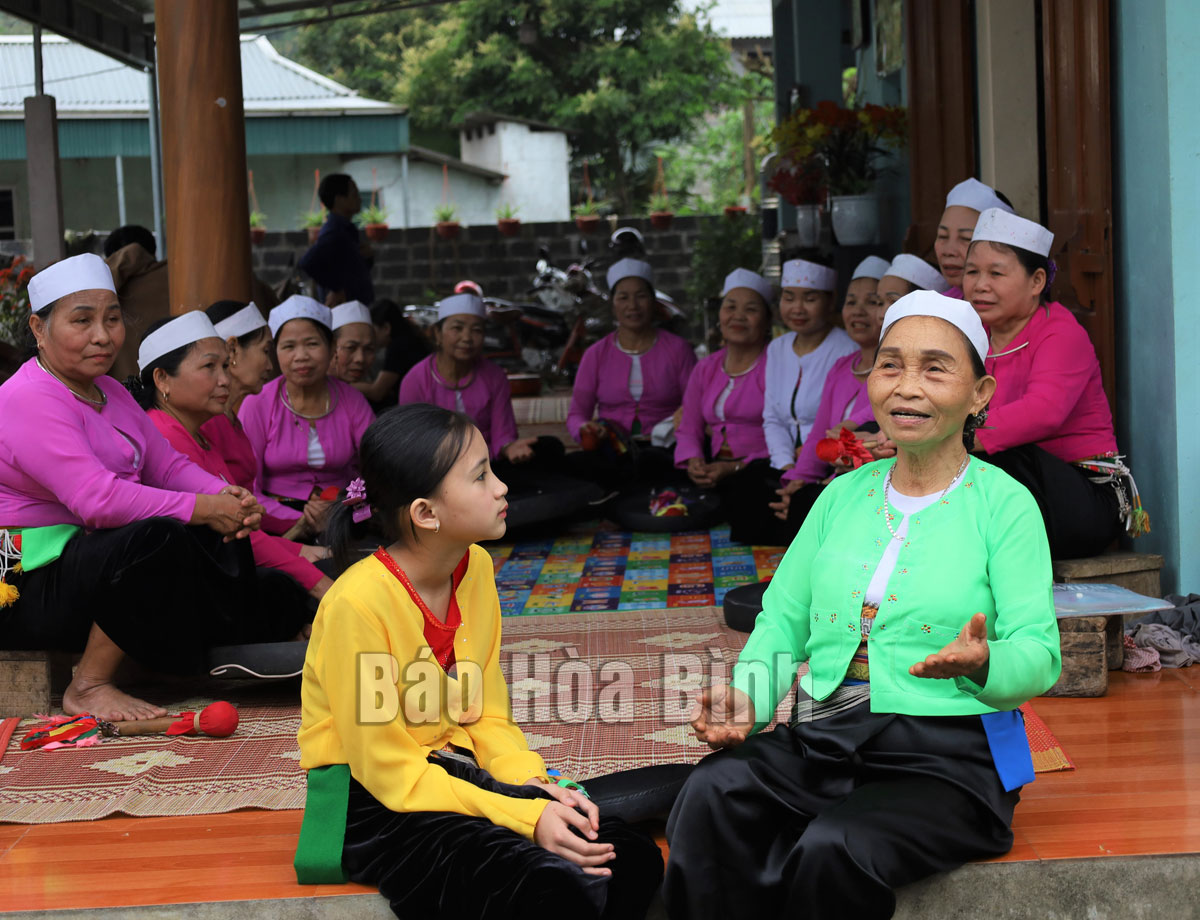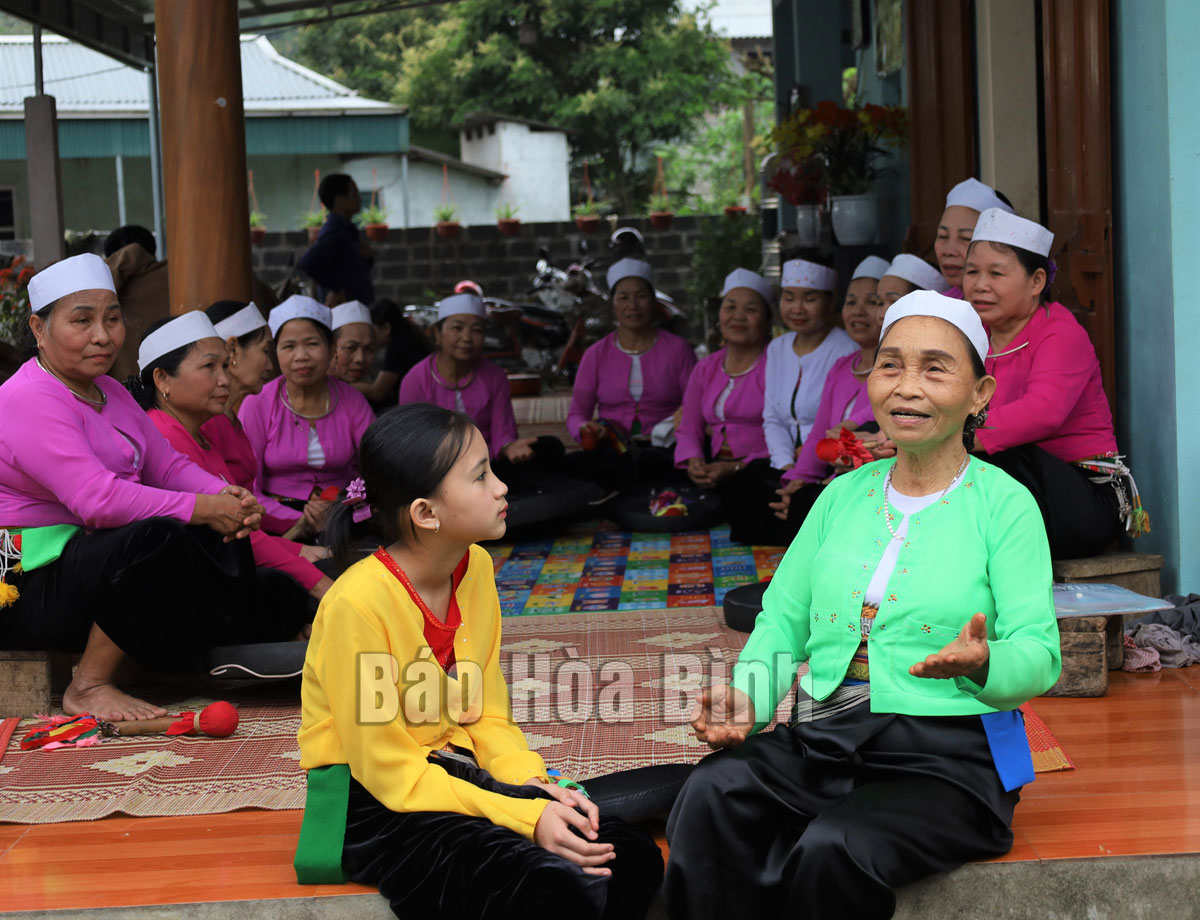
(HBO) - The people of ethnic groups in Kim Boi district of Hoa Binh district have been proud to belong to the Muong Dong area - one of the four Muong regions (Bi - Vang - Thang - Dong) which is rich in cultural identity.

Meritorious artist Bach Thi Dao in Xuan Thuy commune
(Kim Boi district) teaches folk singing to young people.
At present, residents in Xuan Thuy, Vinh Tien, Vinh Dong,
Kim Lap and Nam Thuong communes are still keeping a large number of Muong
gongs. Most of the hamlets and wards have established art teams, equipped with
12 gongs for practice and performance. Clubs have been set up in several
localities to preserve cultural identity, with focus on preserving and
promoting the value of Muong gong art and Muong folk songs.
Meritorious artist Bach Thi Dao, head of the Muong folk
singing and gong club in Xuan Thuy commune, said that from the love for Muong
culture, with the permission of the local Party Committee and authorities, the
club was set up and has operated regularly. The club is also often invited to
perform to serve tourists at Kim Boi Mineral Spring resort.
This year, due to complicated developments of the COVID-19
pandemic, the Muong Dong festival did not have festive activities as in
previous years, but still held the ritual ceremony with the participation of
more than 200 people living in Vinh Dong commune and some neighboring communes.
The festival has been re-acted from the 2017 Lunar New Year on the 7th and 8th
days of the first lunar month.
According to Nguyen Thanh Ha, head of the district's
Division of Culture and Information, in recent years, along with the Muong Dong
festival, other traditional festivals have been re-acted and organised,
contributing to the promotion of local culture and tourism. They include the
Xuong Mua (going to the field) festival in Chanh hamlet of Vinh Dong commune;
Sim pagoda festival - Sim Ngoai hamlet, Hop Tien commune; Lap communal house
festival - Lap hamlet, Kim Lap commune; Ne pagoda festival - Ne hamlet, Xuan
Thuy commune; Boi pagoda festival - Boi Ca hamlet, Nam Thuong commune; Ba Bi
Communal House - Ba Bi hamlet, Hung Son commune; and Da pagoda festival - Treo
hamlet, Tu Son commune./.
With an increasingly vibrant and widespread emulation movement aimed at building cultured residential areas and cultured families, Yen Thuy District has been making steady progress toward improving both the material and spiritual well-being of its people, while fostering a civilized, prosperous, beautiful, and progressive community.
Once lacking recreational spaces and community facilities, Residential Group 2 in Quynh Lam Ward (Hoa Binh City) has recently received attention for the construction of a new, spacious, and fully equipped cultural house. The project followed the model of state support combined with public contributions in both labor and funding.
The "All people unite to build cultural life" movement, which has been effectively integrated with Kim Boi district’s socio-economic development goals, is fostering a lively spirit of emulation across local residential areas, hamlets, villages, public agencies, and enterprises. In addition, through the initiative, traditional cultural values are being preserved and promoted, while community solidarity and mutual support in poverty reduction and economic development are being strengthened.
A working delegation of the Hoa Binh provincial People’s Committee led by its Permanent Vice Chairman Nguyen Van Toan on June 11 inspected the progress of a project to build the Mo Muong Cultural Heritage Conservation Space linked to tourism services in Hop Phong commune, Cao Phong district.
Born and growing in the heroic land of Muong Dong, Dinh Thi Kieu Dung, a resident in Bo town of Kim Boi district, in her childhood was nurtured by the sweet lullabies of her grandmother and mother. These melodies deeply imprinted on her soul, becoming an inseparable part of her love for her ethnic group's culture. For over 20 years, this love for her hometown has driven Dung to research, collect, and pass down the cultural values of the Muong people to future generations.
In the final days of May, the Ethnic Art Troupe of Hoa Binh Province organized performances to serve the people in remote, mountainous, and particularly disadvantaged areas within the province. These were not just ordinary artistic shows, but they were the meaningful journeys aimed at spreading cultural values, enhancing the spiritual life of the people and contributing to the preservation of ethnic minority cultural identities.



